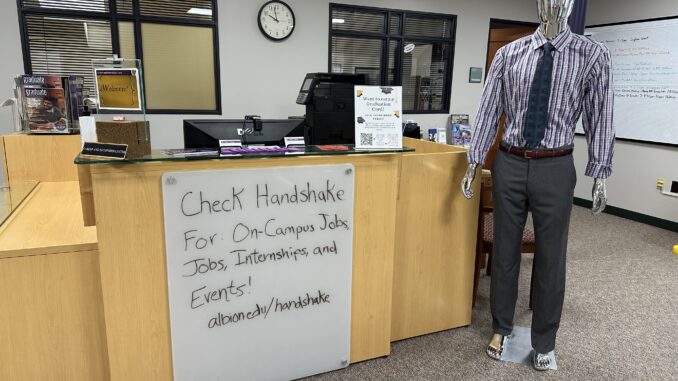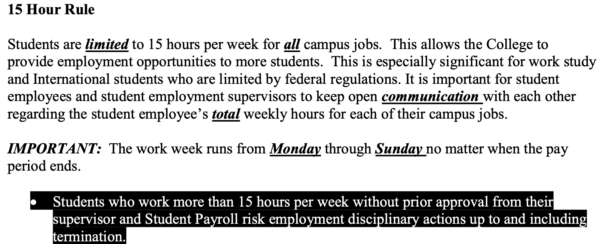
Albion College holds roughly 1,300 students, and the campus itself offers over 400 employment opportunities, according to Assistant Director of Human Resources (HR) Ashley Pion, alumna ‘23. Based on these numbers, more than a quarter of students could hold on-campus jobs at any given time.
So, how exactly does student employment work?
Student Perspectives – Why Work on Campus?
Within the hundreds of job opportunities on campus, there are a variety of different responsibilities students can have.
Berkley junior and Assistant Director of the Writing Center Robert Belf said he enjoys working with the writing center staff because “it’s a unique dynamic that I don’t think you really find anywhere else.”
During shifts, Belf said he’s either “prepping for a consultation,” doing homework or preparing for staff meetings.
Not all campus jobs are alike, though. According to Houston senior Connor DeEros, working at the IT Help Desk “is not a job where you get to sit and do your homework.” DeEros said he believes he makes “an impact on Albion’s college campus” at his job.
“My favorite part about my job primarily – not just with student workers but with other staff on campus – is getting to educate and teach people rather than just doing it for them,” DeEros said.
Redford senior and community assistant (CA) Carly Fraser said she’s “always on call,” because she’s the only CA in Ingham Hall. She added she spends most of her time doing walkthroughs, planning events, interacting with residents and doing room checks.
“I wanted to apply to be a community assistant because I thought it would be a good way to get some on-campus experience and interact with residents,” Fraser said.
How Many Hours Can You Work?
Pion said students “can’t work greater than 20 hours a week” because of full-time student commitments, though they can work additional hours off campus.
Exceptions to the 20 hour rule include flat rate pay positions, Pion said. She added that these jobs may look like “positions where there’s not really a scheduled shift,” such as CAs or AmeriCorps employees.
“That flat rate pay limits the ability, depending on the type of job, for getting another job on campus,” Pion said. Fraser said she generally works 20 hours a week. She added that typically, CAs cannot hold other on-campus jobs.
“They want to make sure you’re making time for yourself as well,” Fraser said. “And making time to get all of your work done as a student.”
Belf, however, said he usually aims to work a set amount of hours each week, since he uses time sheets for his position.
“I have to get eight hours a week as a target,” Belf said. “I can pick up more shifts if there’s a chance to.”
Pion said that Albion “can’t require a student, while classes are in session, to work a full-time on-campus job,” adding that “once classes aren’t in session, students can work up to 40 hours a week.”
Though 20 hours is now the weekly maximum for student employees to work, it hasn’t always been the case. Pion said that during the ‘23-’24 academic year, the maximum was 15 hours a week, adding that there is “some updating to do” since the current Student Employment Handbook still states that “students are limited to 15 hours per week for all campus jobs.”

DeEros said the IT Help Desk currently has a 15 hour weekly maximum for student workers.
“I spend the full 15 on my job. I, like many students on campus, do not have financial support outside of my own income,” DeEros said. “So I work the full 15 at the help desk, and then I also work an additional 20 hours off campus.”
Associate Director of HR Stacey Hobart said the previous hour shift had nothing to do with the students and was “more a financial thing for the college.”
“It’s back to 20 now,” Hobart said. “The college is in a way better position than they were three years ago.”
The Payment Process
According to Michigan’s Bureau of Employment Relations, “effective February 21, 2025, the minimum wage rate is $12.48 per hour.” Hobart said that this change was implemented into student pay.
“Any time minimum wage changes in the state of Michigan, all employees have to go up at least to that minimum wage standard,” Hobart said.
Pion said that the college has “a baseline that all students will be receiving that $12.48 minimum wage.” However, she added that in some instances, a three-tier system may allow some students to receive higher pay.
“Supervisors have the option to submit a request for a higher level tier based on the job description,” Pion said. “There’s certain things within each tier that the job description has to meet in order to be granted permission for that higher rate of pay.”
DeEros said the IT Help Desk used the tiered system in the past, where students would get paid based on experience and task level.
“I am unbelievably grateful for Albion College increasing our pay to the average standard,” DeEros said.
Hobart said the tiered system does still exist, but it’s no longer as common.
“There’s a few exceptions, but the way that we have changed the policy, there’s not going to be very many students that aren’t making $12.48 an hour,” Hobart said. “They’re going to have to have a higher role and take on way more responsibility.”
Some students may qualify for the Work Study-Program, which uses money from the federal government to pay student employees. According to the student handbook, “students are selected for college work-study based on financial need.” The handbook also states that the only difference between work-study positions and non-work-study positions is the source of funding for the student’s wages.
Growing Student Employment; Advice for Applicants
Pion said that student employment “is something that we are looking to grow.” She added that over the summer, trainings were held for student employment supervisors “to help with supervisors taking that lead of professionalism.”
To continue enhancing the student employment experience, Pion said this year HR and the Office of Marketing and Communications (Marcom) are trying something new.
“We’re going to start a student employee of the month program,” Pion said. “Kind of making student employment a little bigger, more so than just you show up, clock in and out and then you’re done for the day, type of thing.”
Pion said student employees of the month will be nominated by their supervisors based on “a professional development theme.” She added that winners will be announced, and five students out of the winners will be randomly selected to be highlighted by Marcom on TVs around campus and on the HR website.
Director of the Career and Internship Center (CIC) Troy Kase said that a primary goal of the CIC is to treat the campus job search “very similarly” to students looking for full-time work.
Kase recommends that when students find a job they’re interested in, they deliver their resume by hand, in person.
“The students that actually stop by and express some kind of interest and why they’re interested in that job; they’re the ones that stand out,” Kase said.
Hobart said student employment holds students “accountable.”
“There’s a big variety of jobs that students can have,” Hobart said. “I think it gets them ready for the real world.”

Leave a Reply